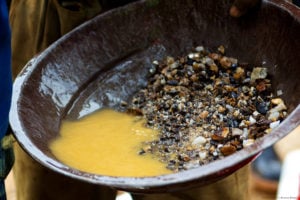Date: Wednesday, 07 November 2018
 (Photo from the Enough Project)
(Photo from the Enough Project)
Central Africa
The Democratic Republic of the Congo (DRC) has historically been the focal point of devastating internal conflict since colonial times, and this has persisted to the present day. King Leopold II’s reign was one of the most brutal in history. Following independence in 1960, the conflict has continued to worsen. Since 1998, upwards of 5.4 million lives have been claimed, the largest death toll due to one cause since World War II. Unfortunately, the United States contributes each day to policies that mirror those of the colonialist era.
Overview
The fundamental reason why these human rights abuses are able to continue is a culture of resource extraction and exploitation that has been perpetuated in the DRC. Instead of this culture occurring only during colonial times, it is happening at this very moment. According to most estimates, the region comprising the DRC contains upwards of 24 trillion dollars-worth of natural resources, rendering it the richest country on earth. These minerals are critical for the United States because they are involved in the manufacturing process of consumer technology goods. Tungsten, tin, tantalum and gold, which are found in every laptop, tablet, and phone, have been deemed by the international community to be “conflict minerals”.
Each of these minerals plays a foundational role in the consumer electronic production process. Tin is a vital component in the process of coating other metals to create alloys and prevent corrosion. In combination with tungsten, this generates durability to withstand high-temperature situations. Gold, prized for its malleability, and tantalum are both instrumental in conductivity. These minerals are also used in car production, jewelry and industrial machinery. Therefore, the demand is extremely high, and the United States and other countries give hundreds of millions of dollars for the acquisition of these minerals.
Rather than going toward promoting self-determinism and economic vitality for artisanal miners, these minerals have been monopolized by armed rebel groups as a means of securing profit, analogous to the sale of illicit drugs in other conflict zones throughout the world. Unlike illicit drugs, however, the exchange of these minerals is recognized as a legitimate business activity by the international community, and therefore has not attracted the same level of scrutiny. To make matters worse, the United States lacks incentive to ameliorate the situation due to a deeply rooted interest in obtaining these minerals and has historically maintained a primarily passive stance. These minerals serve as the fundamental source for funding for armed rebel groups equating to anywhere from $300 million to $1.4 billion per annum. This money fuels the procurement of weapons and enables the perpetuatuation of conflict, leading to the rapid militarization of the country. Armed rebel groups function by maintaining their presence in artisanal mines and engaging directly with miners, who are often stolen from their homes and enslaved. Armed groups actively participate in illegal taxation efforts and forced labor as a means of procuring and selling minerals, thereby supplementing income. From the mines, these groups transport minerals through highly decentralized trade networks which interweave between local and foreign actors. These trade networks often leave violent trails, as armed groups frequently employ brutal intimidation tactics.

(Photo from Jewish World Watch)
Responses
Despite the lack of international attention, there has been some progress in the United States related to the trade of conflict minerals. The most comprehensive effort occurred in 2010 when the Dodd-Frank Wall Street Reform and Consumer Protection Act was passed into law. Section 1502 of the law requires publicly traded companies to annually disclose to the Securities and Exchange Commission the details of their supply chains, which creates pressure for conflict-free sourcing. Any association with conflict mines in the DRC must be documented, and the information made available to the public. While the law does not require companies to source conflict-free minerals, the public nature of the reporting has sparked companies to take action to trace, audit and certify their supply chains. Major brand companies like Intel have taken admirable strides to ensure that their operations and the resulting products do not promote and support violence. In 2014, Intel innovated the first certifiably conflict-free microprocessor and has since been dedicated to become completely conflict-free. Since the enactment of Dodd-Frank, more companies have elected to comply with the rules, and consumers have advocated for companies to ensure their supply chains are not contaminated by unverified materials. Since April of 2017, “420 mines in eastern Congo had been validated as conflict-free by multi-stakeholder teams made up of U.N. officials and Congolese civil society, business, and government representatives”. While Section 1502 of Dodd Frank has yielded substantial effects, there is still much work to be done. There has been an increase in the smuggling of conflict gold as crackdowns on the tungsten, tin and tantalum trade have yielded results. Gold is relatively easier to smuggle, since small quantities have high value. Though strides have been taken to increase transparency, armed groups are still profiting.
Colonialist Policies
Many of the practices occuring in the DRC are a mirror image of the policies instituted by King Leopold pre-1960. Colonialist tendencies are still manifesting themselves in our everyday lives. Congolese women and children are often subjected to the worst trauma – experiencing sexual assault and physical torture. Almost every person in the United States owns a cellphone, computer or tablet. Yet, few are aware that these devices are serving as a sustainable flow of funds to armed groups in the DRC. Our consumer electronic devices are fabricated at the expense of millions of Congolese lives, and this is enabled by the deep rooted colonialist policies that have not disappeared despite independence.